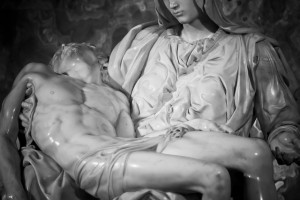Why Did Jesus Have to Die? (Heidelberg Catechism Q. 40)

 Pieta, Michelangelo (photo Giulio Menna, cc 2.0)
Pieta, Michelangelo (photo Giulio Menna, cc 2.0)We are in the season of Easter. This is when, of all seasons of the year, our attention needs to focus on the resurrection of Christ. But we find our selves asking instead “Why did Jesus have to die?”
Ours tends to be a “Good Friday” faith. We see the empty tomb and we think “The Cross put him in there.”
So why not ask the Good Friday question directly? Maybe Easter will give us enough hope to face it.
Why did Jesus have to die?
The Heidelberg Catechism (the much loved 450 year old summary of biblical Christianity about which I’ve not blogged in too long) puts it as plainly as can be:
40 Q. Why did Christ have to suffer death?
Why indeed. Couldn’t he have simply begun to reign as King, as the disciples seemed to hope? Couldn’t someone who poured out so much love to so many at least avoid death by a lynch mob?
Here’s the Catechism’s answer:
A. Because God’s justice and truth require it:
nothing else could pay for our sins
except the death of the Son of God.
You can take that very brief statement in a number of ways. Which one you choose will depend on the kind of drama you see unfolding in the life of Jesus.
Christ’s Drama as a Tragedy
Our hope that Christ might have avoided the cross comes from seeing a merely human drama playing out:
Jesus was a wonderful man, but just a man.
The authorities somehow turned against him and that is a tragedy.
The Catechism assumes a bigger drama.
Christ’s Drama as a Western
Christ’s drama might be a “western,” but there are no Cowboys involved. Okay, what I mean is that there is a Western (i.e. European as opposed to Asian) way of thinking about the story.
If you circle the words “justice” and “pay” and “death” you have the outline of the usual Western theological drama. It is rooted in St. Anselm’s writings long before the Reformation:
Our sin is a great crime, a breach of God’s law, and must be punished by death.
God the King has been dishonored, and the infinite price must be paid.
Christ alone, God incarnate, is the only one whose death can pay it.
Christ’s Drama as a Mystery
You can think of Christ’s drama as a “mystery” too, but without need for a detective to figure out whodunnit.
The clues might come to mind if you circle the words “God’s” and “truth.”
Picture humanity created for TRUE life, communion with God.
Picture humanity choosing an UNtrue life, a cursed life.
We chose what God had told us would lead to bad consequences back in the garden: we turned away from intimacy with God in the foolish attempt to know, really experientially know, not only good but evil.
God had said death would come if we chose that, and it did.
Then circle “death” and “Son of God.”
The second Person of the Trinity, the eternal Son of God willingly came to us, became human, specifically so that he could take the curse for us.
Taking the death that was humanity’s consequence, Christ freed us from death.
That’s another biblical, and very traditional, Christian approach to the question of why Jesus had to suffer death. He chose the cross “for the joy set before him” (Hebrews 12:2) of bringing us life instead of death.
It is not just that the empty tomb implies the cross.
The cross happened so that we could get to the empty tomb.
The post Why Did Jesus Have to Die? (Heidelberg Catechism Q. 40) appeared first on Gary Neal Hansen.



